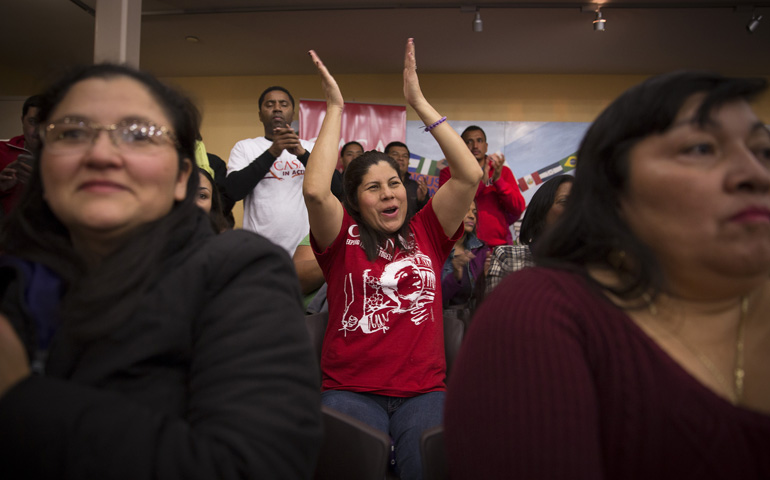
A woman at CASA de Maryland's Multicultural Center in Hyattsville, Md., applauds Thursday after hearing President Barack Obama's national address on immigration. (CNS/Tyler Orsburn)
Catholic groups across the country have been quick to applaud President Barack Obama's executive order on immigration, but they are equally quick to remind that more work remains to be done before finding a "humane" fix to our country's immigration system.
The executive order, which the president delivered Thursday in a primetime speech, expands the government's 2012 Deferred Action for Childhood Arrivals and provides temporary relief from deportation for more than 4 million undocumented immigrant parents who have lived in the country for more than five years.
"Generally, we are celebrating this announcement," said Michelle Sardone, legalization program director for the Catholic Legal Immigration Network, or CLINIC. "It's going to help close to 5 million people. But we're definitely still working toward finding a permanent solution."
"This a temporary fix," she said. "There's still more fighting to be done, to make sure that everyone is included."
Press releases from various Catholic organizations echoed the sentiment:
- "As we rejoice tonight, we are also fully aware that the president's action is a temporary fix and that we must continue the hard work of promoting comprehensive reform," read a statement from NETWORK, a Catholic social justice lobby. " ... But tonight marks an important down payment toward a more fair system."
- A statement from the Franciscan Action Network read: "We applaud this first step that the President took and thank him for putting the importance of the lives of millions of people over political games. We now call on Congress to provide relief for the millions of families who will still be broken apart by deportation and are looking for an earned path to citizenship."
- And from Catholic Charities of the New York archdiocese: "While we are positive about the protections afforded vulnerable families by this executive order, there is undoubtedly more work to be done."
In a press release from the U.S. bishops' conference, Bishop Eusebio Elizondo, auxiliary bishop of Seattle and chairman of the bishops' Committee on Migration, wrote that the conference has "been on record asking the Administration to do everything within its legitimate authority to bring relief and justice to our immigrant brothers and sisters." He "strongly" urged "Congress and the President to work together to enact permanent reforms to the nation's immigration system for the best interests of the nation and the migrants who seek refuge here."
In the same release, bishops' conference president Archbishop Joseph Kurtz of Louisville, Ky., quoted Pope Francis, who wrote for the 2014 World Day of Migration last January, "Every human being is a child of God! He or she bears the image of Christ! We ourselves need to see, and then to enable others to see, that migrants and refugees do not only represent a problem to be solved, but are brothers and sisters to be welcomed, respected, and loved."
In an email to NCR, Kevin Appleby, director of the bishops' Office for Migration Policy and Public Affairs, wrote, "The President's action would protect families from separation and end the trauma many children experience when their parents are deported. The bishops support the action because it will help end the human suffering caused by this flawed system. From a humanitarian perspective, they see it as the right thing to do."
Ashley Feasley, an immigration policy adviser with the bishops' conference, said "affected communities" will be energized and made hopeful by the order. She said she expects "a boost in encouragement" at the grassroots level.
But she added that for the bishops and the USCCB, she doesn't think the executive order will have an impact moving forward to find a legislative fix for America's immigration system.
"We will continue to work with Congress to create a permanent and lasting solution," she said. "Particularly, we will work to advocate with all members of Congress for humane reform."
Timothy Matovina, executive director of the University of Notre Dame's Institute for Latino Studies, said the executive order boosts morale for Latinos, "maybe ... more than one might expect."
"The need is so great, and the progress has been so sporadic and halting for so long, so just to get one thing ... a small reprieve and some hope of continued process, I think it's going to give people a big charge," he said.
"People are amazingly resilient. They just see this tremendous need, and they can't allow themselves to drop out," he said of activists working for immigration reform. "I don't just hope, I think that this will give people energy to carry on."
In Chicago, a city with a rapidly growing Hispanic population, "it's already happening," said Elena Segura, director of the Office for Immigrant Affairs & Immigration Education for the Chicago archdiocese. "Even within the last 24 hours," she said.
"We're getting a lot of calls and a lot of people asking what they can do, how they can participate, immigrants and non-immigrants," she said. "But this is going to be a long journey, even just getting all the paperwork together" so undocumented immigrants, many of whom do not speak or read English, can register their existence with the government.
Segura is already busy setting up workshops.
"There is a lot of accompaniment to do," she said.
[Vinnie Rotondaro is NCR national correspondent. His email address is vrotondaro@ncronline.org.]



